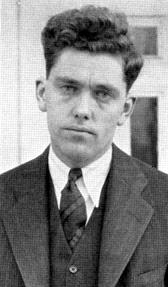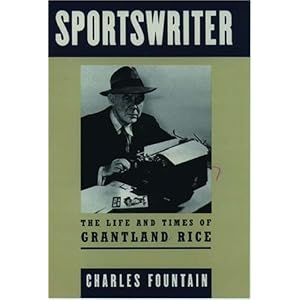
 "Ears" Whitworth led Alabama to the SEC title in baseball in 1934
"Ears" Whitworth led Alabama to the SEC title in baseball in 1934SEC Baseball was almost an afterthought at some schools in the early days of SEC baseball, almost treated like today's various "club sports". The SEC started in 1933 and had baseball as one of its sports in that same year. Charter member Tennessee, however ,didn't field a team until 1939 after suddenly dropping the sport after the 1931 season. The Vols' first head baseball coach in SEC play was John Mauer, who was also the Vols' basketball head coach at the time. Mauer's baseball position was more of an afterthough as his primary focus was basketball where he was head coach at five schools ,including Miami of Ohio where his star pupil was oddly enough Walter Alston of Brooklyn and Los Angeles Dodger baseball fame. Mauer had the odd ,and of course unplanned knack, of leaving one job and being replaced by a coach who acclaimed national fame if not at that school ,somewhere else in the sporting world.
Mauer came to Oxford to coach Miami's Redskins from Kentucky,where he coached from 1927-1930. Kentucky replaced Mauer with Adolph F. Rupp,who led the 'Cats through the '72 season.When Mauer left Oxford for Knoxville, Miami replaced him with Weeb Eubank, who would lead the Baltimore Colts to the NFL title in 1958 and 1959 and the New York Jets to the world title in Super Bowl III. After leaving Knoxville in 1947, Mauer coached Army until 1951 when he was replaced by Elmer Ripley, who was one of the more successful and respected coaches at the time with stops at Georgetown,Notre Dame and Yale.Ripley left West Point a year later to become head coach of the Harlem Globetrotters. Mauer coached one other SEC basketball program, Florida ,where he was replaced by Norm Sloan in 1961, the first of Sloan's two stents as the Gators' mentor sandwiched around a 12 year term as NC State's head coach which climaxed in 1974 with the National Title.

 The head Junkyard Dawg led Auburn to the 1961 SEC East baseball title as HC
The head Junkyard Dawg led Auburn to the 1961 SEC East baseball title as HCFew names are associated with baseball like Casey Stengel. Whereas the SEC didn't start play until 1933, the teams that make up the conference were playing a variety of sports going back to the 1880's. In 1913, the Ole Miss Rebels were coached by none other than the "Ole Perfessor" himself, who aquired the nickname "The Professor" during his one year in Oxford as Ole Miss' head baseball coach. A southpaw, his dream of being a dentist floundered due in part to the lack of left-handed instruments which hindered his training. After a year with Brooklyn's Montgomery AA team, the Kansas City native hooked up with his old high school coach Bill Driver who was now Ole Miss' football and basketball coach who got Stengel the job coaching the Rebels' baseball squad that one season before resuming his mediocre at best playing career which elolved into a superb managerial career with the Yankees.

"The Ole Perfesser" was Ole Miss' head baseball coach in 1913
Five years earlier in 1908, Vanderbilt turned to one its former players and graduates who would soon go on to great fame as a sportswriter. Grantland Rice, who captained Vandy to the 1901 Southern Conference baseball championship, took over the reigns of the Commodore baseball program after covering the new Nashville Vols of the new Southern Association shortly after graduation. A series of moves to larger cities in sportswriting brought him back to Nashville to write for the new Tennessean before coaching Vandy for one season and returning to writing. It is not known if the Commodores' infield that season was comprised of famine, pestilence, destruction and death. The crest of this Nashville cyclone went 11-9-2 at the precipice of the Vanderbilt campus before untold spectators peering down upon the bewildering panorama spread out against the green plain.
 Vanderbilt turned to former player Grantland Rice for the 1908 season as HC
Vanderbilt turned to former player Grantland Rice for the 1908 season as HCVanderbilt went through 18 more baseball coaches before Larry Schmittou was hired in 1968, the first year Vandy offered baseball scholarships. One of those coaches was Wallace Wade who was the Commodores' head baseball coach in 1922 and 1923 as well as one of Dan McGugin's assistant football coaches.Alabama hired him away as head football coach in 1924. Most other baseball coaches at Vandy were less known either for their Vandy tenure, or any other sports venture. One coach's participation in a game is well-known or well-chronicled in a minor league baseball game in 1931.
 Former Vandy coach Harley Boss played first in '31 for Chattanooga as the Lookouts' pitcher Jackie Mitchell (a girl) struck out Ruth and Gehrig
Former Vandy coach Harley Boss played first in '31 for Chattanooga as the Lookouts' pitcher Jackie Mitchell (a girl) struck out Ruth and GehrigVanderbilt's Schmittou from 1968-1978 was one of many football recruiting coordinators that doubled as head baseball coach. This practice was made popular by Ole Miss' John Vaught following a disappointing 5-5 mark in 1950. Vaught hired Ole Miss baseball coach Tom Swayze, who had also been a high school football coach, to this 'contact' position. Swayze's job was to evaluate talent throughout Mississippi and to get to know the high school coaches firsthand. Vaught's committment to the "Mississippi Boys First Program"paid off as the Rebels keyed in on Mississippi players as well as a few across state lines in Memphis and Louisiana. Ole Miss won 6 SEC titles and one National Title from 1952 to 1964 as Vaught's teams were top shelf until his retirement following the 1970 season. Swayze fielded some excellent baseball squads,too, winning three SEC titles and making three trips to the College World Series in his tenure.
Ole Miss' Johnny Vaught introduced the 'recruiting coordinator' concept to the SEC using his school's baseball coach, Tom Swayze as many others followed suit
Florida's Dave Fuller coached the Gators' baseball team from 1948-1975. He also served as a football assistant from '48 to '76 . When Bob Woodruff came to Florida from Baylor in 1950, he placed Fuller in charge of recruiting and immediately recruited local boy, Doug Dickey to Florida where he starred in baseball and football before going on as head coach at Tennessee and Florida and Tennessee's athletic director. Fuller's biggest recruiting coup was actually talking Woodruff's succcessor and Dickey's head coaching predecessor at Florida, Ray Graves into taking a chance on a 180 lb lineman with no scholarship offers.Florida's Big Bend and Monticello native Jack Youngblood came to Gainesville in 1967 making All-American his senior year in 1970.Youngblood, who had already bulked up to 225 in his first varsity season in 1968, earned his scholarship in the Gators' first game of the 1968 season as he also handled Florida's kicking chores and his 42 yard field goal was the difference in a 23-20 win over Air Force in Tampa. He earned All-American honors in 1970 before a 14 year career with the Los Angeles Rams of the NFL culminating in Youngblood's induction in the NFL Hall of Fame in 2001. Youngblood thanked Fuller for taking a chance on him, and thanked Graves, in his acceptance speech.
Dave Fuller talked Ray Graves into taking a chance on un-recruited future NFL Hall of Famer Jack Youngblood.
Now SEC baseball coaches just coach baseball.




